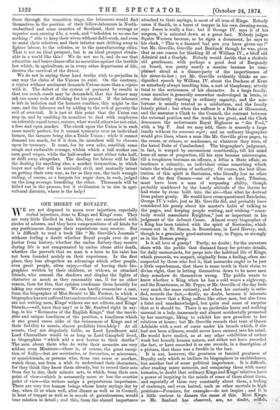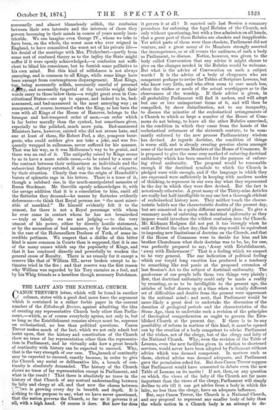ONE MISERY OF ROYALTY.
WE are not disposed to moan over injustices, especially verbal injustices, done to Kings and Kings' sons. They are very little libelled in this life, they are surrounded with circles of adorers, and they have compensations of all kinds for any posthumous damage their reputations may receive. But it is difficult to read a book like "Mr. Greville's Journals" without feeling a doubt whether Royal people ever do get justice from history, whether the undue flattery they receive during life is not compensated by undue abuse after death, whether the proverb that no man is a hero to his valet has not been founded mainly on their experience. In the first place, they lose altogether an advantage which other people, even great people, often enjoy,—that of having their bio- graphies written by their children, or widows, or attached friends, who conceal the shadows and display the lights of character as much as they reasonably can, if for no other reason, then for this, that opinion condemns them heartily for taking any contrary course. We can hardly remember a case, from the biographer of Miss Brontë to Mr. Forster, in which a biographer has not suffered for candour about a friend. Kings' sons are not writing men, Kings' widows are not editors, and Kings' friends,—well, have they any? or is Mr. Sanford right in say- ing, in his "Estimates of the English Kings," that the inevit- able and unique loneliness of the position, a loneliness which is one grand cause alike of the viciousness of Kings and of their liability to mania, almost prohibits friendship ? At all events, they are singularly liable, as Lord Lyndhurst said Lord Chancellors would be as long as Lord Campbell lived, to biographies "which add a new horror to their deaths." The-men about them who do write their memoirs are very seldom even Ministers—there is, of course, the great excep- tion of Sully—but are secretaries, or favourites, or mistresses, or quasi-friends, or persons who, from one cause or another, watch them, not from a wish to understand their characters, for they think they know them already, but to record their acts from day to day, their minute acts, to which, from their own point of view—which is necessarily more or less the courtier point of view—the writers assign a preposterous importance. There are very few human beings whose hasty sayings day by day, when ill or when well, after dinner as well as in Council, in heat of temper as well as in moods of garrulousness, would bear relation in detail ; and this, from the absurd importance
attached to their sayings, is most of all true of Kings. Nobody cares if Smith, in a burst of temper in his own dressing-room, says Jones is really a liar; but if George IV. says it of his surgeon, it is minuted down as a great fact. Nobody judges Squire Western because, as he signs a document, he says to
his clerks " This is a damned bad pen you have given me I" but Mr. Greville, Greville and Bentinck though he was' gives that as one reason for thinking ill of William IV., a bluff old Admiral and a Guelph. Nobody would decide that a choleric old gentleman, with perhaps a good deal of Burgundy on board, was pretty nearly a maniac because he com- plained aloud at a dinner-party of the impertinence of his sister-in-law ; yet Mr. Greville evidently thinks an un- dignified speech. by William IV. about the Duchess of Kent as somebody always insulting him, a sort of blasphemy, utterly fatal to the seriousness of his character. In a large family, some member is generally somewhat undeveloped in brain, or even distinctly wanting in ordinary capacity, and the mis- fortune is usually treated as a misfortune and the family faintly pitied ; but when the sufferer is a Duke of Gloucester, and the narrator a Clerk to the Council, the contrast between the external position and the truth is too great, and the Clerk denounces the unfortunate Royal Highness as "the Fool," with a big F. And we may add, there is scarcely a large family without its murals sujet ; and an ordinary biographer would give lines, where a man like Mr. Greville gives pages, to the errors, or crimes, or madnesses, or whatever they were, of the hated Duke of Cumberland. The biographer's judgment, in fact, is warped by unconscious courtiership, till his mind loses all sense of proportion, till his eyes become microscopes, till a roughness becomes an offence, a betise a State affair, an insolence a calamity, an individual crime something which taints the whole system of authority. Of course, the best illus- tration of this spirit is Suetonius, who literally has no other idea of the first Cgesars—one of whom at least, Tiberius, must have been a man of surpassing ability, though probably maddened by the lonely altitude of the throne he had stone by stone built into the air—than what he derived from palace gossip. He would have cross-questioned Batchelor, George 'V.'s valet, just as Mr. Greville did, and probably have considered his gossip about his master's habit of talking to the pages, and keeping people waiting, and wishing "some- body would assassinate Knighton," just as important in his judgment of the defunct Cesar.. Almost every biographer of a King has been tainted with the spirit of Suetonius, which comes out in St. Simon, in Bourrienne, in Lord Hervey, and, though in a genuinely good-natured way, in Pepys, as strongly as in the Roman gossip.
Is it all love of gossip? Partly, no doubt; for the narrators share with the public that diseased fancy for private details, for daily memoranda, for peeps into the habitual life of Kings, which proceeds, we suspect, originally from a feeling, often un- suspected by those who feel it, that monarchs ought to be just a little superhuman, that there is some truth in their claim to divine right, that in letting themselves down to be mere men they somehow do themselves wrong. The public wants to know whether a King when he has a cold wears a night-cap, and the Bourrienne, or Mr. Pepys, or Mr. Greville of the day feels very much the same curiosity, and when his curiosity is satis- fied, records the fact,—firstly, no doubt, because it interests him to know that a King suffers like other men, but also from a faint and unacknowledged, but quite real sense of surprise that so it should be. There is no particular harm and nothing unusual in a lady, immensely and almost accidentally promoted by her marriage, liking to exhibit her new grandeur to her relatives at home; but Mr. Greville records that trait of Queen Adelaide with a sort of curse under his breath which, if she had not been a Queen, would never have entered into his mind. He would have smiled, as at any other exhibition of rather weak but homely human nature, and either not have recorded the fact, or have recorded it as one records, in a description of a picture, that there was a freckle in the face. It is not, however, the greatness or fancied greatness of Royalty only which so inclines its biographers to snobbishness, but another fact of some political importance. It is difficult, after reading many memoirs, and comparing them with many histories, to doubt that ordinary Kings and Kings' relatives have a power of inspiring in the minds of some of those about them, and especially of those very constantly about them a feeling of contempt, and even hatred, such as other mortals in high positions—Premiers, for example—do not inspire ; and it is a little curious to discern the cause of this. Most Kings, as Mr. Sanford has observed, are, no -doubt, selfish, necessarily and almost blamelessly selfish, the confusion between their own interests and the interests of those they govern becoming in their minds in course of years nearly inex- tricable. We can imagine even George IV., whom we take to have been, on the whole, the worst man who ever reigned in England, to have committed the worst act of his private life— his denial of the marriage with Mrs. Fitzherbert—partly from some sort of confused theory as to the inry the State might suffer if it were openly acknowledged,—a confusion not suffi- cient to blind his conscience, but to furnish some palliative to his own mind. But this kind of selfishness is not always annoying, and, is common to all Kings, while some kings have been exempt from contemptuous disparagement. Most Kings, tog.„..being necessarily selfish, necessarily careful of personal
y, and necessarily forgetful of the terrible weight their words carry to those below them—a weight great even in Con- stitutional States—are apt to appear, and indeed to be, bad- mannered, and bad-mannered in the most annoying way ; an annoyance, of course, increased when the King, as has been the case with all Kings of the House of Hanover, belongs to the brusque and hot-tempered order of men,—an order which is far better morally than the cynical, but sometimes gives, especially to the polished, much more pain. Bad-mannered Ministers have, however, existed who did not arouse hate, and one at least of them, Sir Robert Peel, a shy, pompous bour- geois, who could neither give nor 'take a joke, and was fre- quently wrapped in sullenness, never suffered for his manner. That was his way, as it was Melbourne's way to be genial, and there was an end of it. The antipathy raised by Kings seems to us to have a more subtle cause,—to be raised by a sense of the contrast between their ordinariness as individuals and the subservient flattery extorted, if only in the form of etiquette, by their situation. Clearly that was the origin of Humboldt's bursts of splenetic rage in his letters. There is a trace of it, though a subdued one, in the much-manipulated memoirs of Baron Stockmar. Mr. Greville openly acknowledges it, with the savage addition that it is a consolation to him, amid all the flatteries they demand—he means by flatteries evidently deferences—to think that Royal persons are "the most miser- able of mankind." He himself evidently felt it to the utmost, for there is not a Royal personage with whom he ever came in contact whom he has not besmirched — truly or falsely we are not judging — to the very utmost of his power, either by directly hostile statement, or by the accusation of bad manners, or by the revelation, as in the case of the Hohenzollern Duchess of York, of some in- credible pettiness. We suspect that a dislike of this bitter kind is more common in Courts than is supposed, that it is one of the many causes which sap the popularity of Kings, and that it has conduced directly and powerfully to weaken the general cause of Royalty. There is no remedy for it except a reserve like that of William IIL, never broken except to in- timates tried in the fire ; and that reserve was the that reason why William was regarded by his Tory enemies as a fool, and by his Whig friends as a heartless though necessary Dutchman.



































 Previous page
Previous page